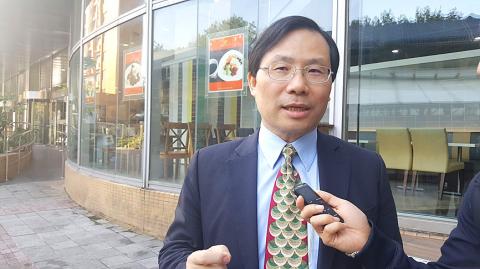A substantial reduction in government subsidies for purchases of new electric scooters next year has triggered serious concern over the uptake of the environmentally friendly vehicles, the Smart Mobility Association Taiwan (台灣智慧移動產業協會) said on Thursday.
The Environmental Protection Administration (EPA) plans to scrap its NT$3,000 (US$98.32) subsidy for purchasers of electric scooters next year, a draft amendment to its subsidy policy released earlier this month said.
The Ministry of Economic Affairs also plans to cut its NT$10,000 subsidy for purchasers of electric scooters by 30 percent to NT$7,000 next year. Local governments are also considering cutting their subsidies.

Photo: CNA
“The association is worried about the EPA’s policy of stopping subsidizing the purchases of new electric scooters in 2020,” Smart Mobility Association Taiwan chairman Jiann-Chyuan Wang (王健全) said in the first electric scooter white paper released by the association.
“We fear the new policy will bring a negative impact and jeopardize the devlopment of Taiwan’s electric scooter industry. Taiwan’s electric scooter industry is still in its infancy stage and is reliant on the government’s subsidy policy to grow,” Wang said.
Electric scooters accounted for 2.1 percent of the nation’s overall scooter purchases as of Oct. 31, the association said.
The biggest factor affecting consumers’ willingness to replace their fuel-powered scooter with an electric model is government subsidies, the association said.
More than 82 percent of Gogoro Inc (睿能) scooter owners said that the government subsidies were the major reason they switched from a fuel-powered scooter, the white paper said.
Gogoro is the nation’s largest electric scooter manufacturer with a 93 percent market share.
Electric scooter buyers can receive as much as NT$30,000 in subsidies from central and local governments, making them more affordable. On average, the combined subsidies save buyers about 35 percent of the price of mainstream electric scooters, which retail for about NT$70,000.
With the existing subsidy programs due to expire on Dec. 31, 19,496 people had applied for the ministry’s subsidy this month as of yesterday, ministry data showed. That was a 13 percent increase from 17,504 applicants in October.
Electric scooter subsidy applications soared 47 percent in October from 11,956 a month earlier, ministry data showed. The ministry has subsidized the purchases of 129,200 electric scooters since the beginning of this year.

Merida Industry Co (美利達) has seen signs of recovery in the US and European markets this year, as customers are gradually depleting their inventories, the bicycle maker told shareholders yesterday. Given robust growth in new orders at its Taiwanese factory, coupled with its subsidiaries’ improving performance, Merida said it remains confident about the bicycle market’s prospects and expects steady growth in its core business this year. CAUTION ON CHINA However, the company must handle the Chinese market with great caution, as sales of road bikes there have declined significantly, affecting its revenue and profitability, Merida said in a statement, adding that it would

RISING: Strong exports, and life insurance companies’ efforts to manage currency risks indicates the NT dollar would eventually pass the 29 level, an expert said The New Taiwan dollar yesterday rallied to its strongest in three years amid inflows to the nation’s stock market and broad-based weakness in the US dollar. Exporter sales of the US currency and a repatriation of funds from local asset managers also played a role, said two traders, who asked not to be identified as they were not authorized to speak publicly. State-owned banks were seen buying the greenback yesterday, but only at a moderate scale, the traders said. The local currency gained 0.77 percent, outperforming almost all of its Asian peers, to close at NT$29.165 per US dollar in Taipei trading yesterday. The

RECORD LOW: Global firms’ increased inventories, tariff disputes not yet impacting Taiwan and new graduates not yet entering the market contributed to the decrease Taiwan’s unemployment rate last month dropped to 3.3 percent, the lowest for the month in 25 years, as strong exports and resilient domestic demand boosted hiring across various sectors, the Directorate-General of Budget, Accounting and Statistics (DGBAS) said yesterday. After seasonal adjustments, the jobless rate eased to 3.34 percent, the best performance in 24 years, suggesting a stable labor market, although a mild increase is expected with the graduation season from this month through August, the statistics agency said. “Potential shocks from tariff disputes between the US and China have yet to affect Taiwan’s job market,” Census Department Deputy Director Tan Wen-ling

UNCERTAINTIES: The world’s biggest chip packager and tester is closely monitoring the US’ tariff policy before making any capacity adjustments, a company official said ASE Technology Holding Inc (日月光投控), the world’s biggest chip packager and tester, yesterday said it is cautiously evaluating new advanced packaging capacity expansion in the US in response to customers’ requests amid uncertainties about the US’ tariff policy. Compared with its semiconductor peers, ASE has been relatively prudent about building new capacity in the US. However, the company is adjusting its global manufacturing footprint expansion after US President Donald Trump announced “reciprocal” tariffs in April, and new import duties targeting semiconductors and other items that are vital to national security. ASE subsidiary Siliconware Precision Industries Co (SPIL, 矽品精密) is participating in Nvidia